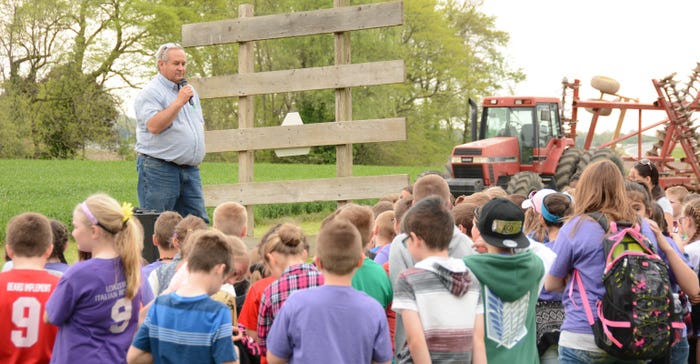
What’s it take to successfully host a few schools’ worth of fourth-graders on your farm for a day — and teach them a few things about agriculture?
The Hadden family should know. They’ve been bringing fourth-graders from 15 schools across Cass and Morgan counties out to their Jacksonville farm every year for 20 years. And before that, they brought preschoolers out for 15 years.
The idea started with Carolyn Hadden, with help from her entire family: husband Bob; son Dale and his, wife, Amy; and son Gary and his wife, Lisa. The Cass Morgan Farm Bureau joined in the effort 20 years ago, and 10 stations across the farm are manned by family, friends and Farm Bureau board members.
Here, Dale offers his best advice for anyone who’d like to do the same:
• Keep it basic. “Don’t get into heavy discussions about GMOs and all that,” Dale says. “We talk about genetically modified seed, but you’re not going to get into all that in a 10-minute stop.”
• Think stations. The Haddens cycle groups of a dozen or so children through 10 stations scattered across the farm: chickens in the shop, seed and technology in the shed, grain outside the shop, donkeys, a heifer or steer, sheep, grain bin, pigs, the tractor and planter, and the combine. Family and volunteers man each station.
• Make it relatable. If you talk about wheat, don’t talk flour, Dale says: “Talk macaroni and cheese. They all eat mac and cheese!” They use fourth-grade-level talking points, in terms they understand or grasp. “If I’m describing the screen in the tractor or combine, I describe it like a video game on their iPad or computer,” he adds.
• Experience (with kids) counts. Dale says they’ve had the same volunteer talk chickens for years — even though she doesn’t raise chickens. Nonetheless, she learned about poultry and can answer questions. “If you’ve done a station year after year, you get questions that make you go home and research.”
• Find communicators. “Find people who are good communicators,” Dale says. “They don’t have to be experts in ag.” Another reason why you need help: You can’t do it all yourself, and your voice won’t hold out after hosting schools for multiple days.
• Go with the flow. Sometimes it rains. Sometimes the bus gets there early. Sometimes you have more time for questions. Sometimes you have less. “Just adapt to the circumstances and go with the flow,” Dale says.
• Don’t be afraid of numbers. Dale isn’t afraid to throw out numbers and make the kids do math. How many acres will a bag of seed plant? How much does that bag of seed cost? So how much does seed cost per acre? “Wheels turn when you say seed costs are $150 per acre. Parents come on these trips, too, and they’ll almost always ask about that when we walk to the next station,” he says.
• Keep it short. Each stop on the Hadden farm averages 10 to 15 minutes. “If you go more than that, they’ll be picking dandelions,” Dale says. Some stations are best with 10 minutes, like the grain bin or the chickens or the grains. Others are easily 15 minutes, like the pigs and the heifer, and the seed and technology, depending on how in-depth you get and how many questions you take.
• Provide background information. Sue Freeman, Cass Morgan Farm Bureau’s Ag in the Classroom coordinator, meets with every fourth-grade class once a month, leading up to the farm visit in late April. They talk about seeds, livestock and GPS, so the kids know what it is when they get to the farm. Background is important, Dale says, so they can share more on the farm.
• Be safe. If you let kids into a tractor, Dale says you need someone attending the ladder. Talk about holding on to the ladder, having shoes tied, going one at a time, and facing the ladder going up and down.
• Know your audience. Haddens also host chamber of commerce events, and they adjust their talking points to business leaders with a higher level of understanding. “It can’t be too basic, but it has to relate to them,” Dale says.
About the Author(s)
You May Also Like






